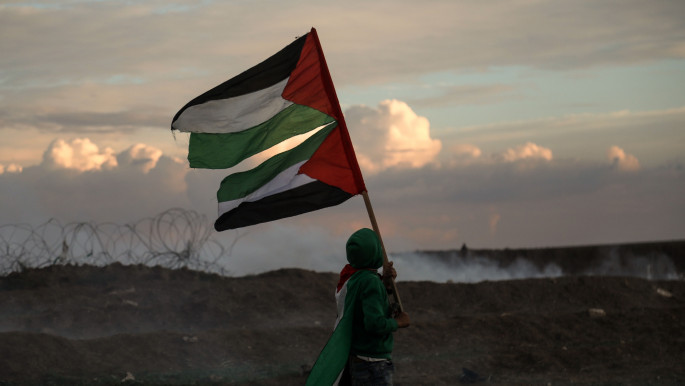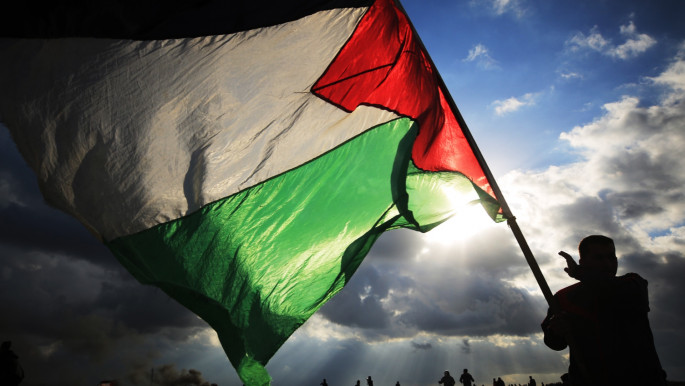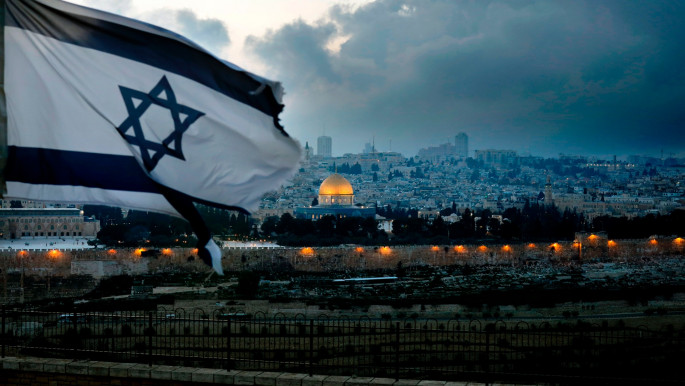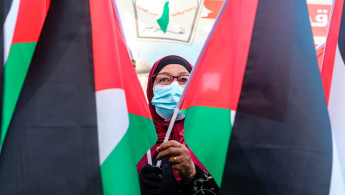Israel normalisation deals reflect the rupture between repressive regimes and Arab societies
Not surprisingly, US President Donald Trump and Israeli Prime Minister Benjamin Netanyahu were the focus of attention to serve both leaders' immediate political ends. The farcical dimension of the ceremony, however, was inescapable.
Netanyahu did not include his foreign minister or deputy in the delegation, only to realise that he was not legally authorised to sign the agreements, leading to a scramble to get power of attorney from his FM.
Also noteworthy was the fact that the Israeli cabinet and Knesset did not know what Netanyahu would sign and only gained knowledge of the text when the Israeli daily Haaretz published it hours after the ceremony.
However, the Israeli government wasn't the only side kept in the dark. Apparently, the Bahraini delegation was trying to inquire about what text their foreign minister would be signing later that day.
And despite Trump's insistence that these were "peace deals" between "warriors", the reality that these three states were never at war did not elude most observers. Neither did the fact that this was about forging a war alliance, namely against Iran.
 |
While the US, Israel, the UAE, and Bahrain were keen on presenting these pacts as agreements between governments and peoples, the reality couldn't be further from the truth |  |
The overdose of Trump-Netanyahu 'love' was not lost on the Arab public, who watched as the US president gave the Israeli prime minister "a token of affection", namely "a key to the White House and it's a key to our country and our hearts", as Trump said.
It was one more affirmation of the markedly inferior status of Arab states in the eyes of US administrations. These nuances only reinforced the conviction among the wider Arab public that these (and other Arab) regimes are mere puppets of a master that doesn't even feel the need to show them any respect.
 |
|
| Read more: How the Israel-UAE alliance formalises new fault lines in the Middle East |
And while the US administration, Israel, the UAE, and Bahrain were keen on presenting these pacts as agreements between governments and peoples, the reality on the ground couldn't be further from the truth.
In fact, this audacious claim is also exposed as a fallacy by the reality in Egypt and Jordan, where decades after peace deals were struck normalisation between people remains strictly rejected and even forbidden by all cultural, academic, professional, and labour unions.
This ice-cold peace also often explodes into popular anger when the Israeli repression of Palestinians escalates.
UAE Foreign Minister Abdallah Bin Zayed spoke about developing a "warm peace" with Israel, even though his country has no political life or parties that can articulate such warmth. In fact, apart from government affiliated media - which is the only media allowed in the UAE - and government backers, the only statements out of the small gulf nation are those of anti-normalisation groups that fervently oppose the deal with Israel.
Meanwhile, Bahrain's foreign minister hailed the agreement as an "historic step on the road to genuine and lasting peace, security and prosperity across the region, and for all who live there, regardless of religion, sect, ethnicity, or ideology." But this statement is belied by the tiny Kingdom's dismal human rights record against any and all opposition, especially against Shia citizens who constitute the majority of the population.
 |
Normalisation pacts with Israel reflect the almost insurmountable gap between the governed and governing in the region |  |
In fact, Freedom House's Index for 2020 gives the UAE and Bahrain a score of 17 and 11 out of 100, respectively. It is a score that reflects both countries' autocratic rule, which neither tolerates dissent nor allows for expression of opinion.
Human Rights Watch's World Report for 2020 describes the human rights situation in Bahrain as "dire," citing the banning of all independent media and opposition groups as well as the arbitrary revocation of citizenship, detention, and harassment of human rights defenders, journalists, and opposition leaders.
The human rights organisation also criticised the UAE for showing "no tolerance for any manner of peaceful dissent", imprisoning human rights activists over social media posts, as well as employing mistreatment and torture against dissidents, some of whom remain in jail despite completing their prison sentences.
It was thus no surprise that the UAE warned citizens and residents of the country against challenging an imminent "sovereign decision" shortly before US President Donald Trump made the announcement of the normalisation deal with Israel. Abu Dhabi also arrested those who voiced opposition to the pact.
 |
|
| Read more: As Arab countries edge towards Israel, what's next for the Palestinian national movement? |
In Bahrain, opponents of the deal made their position clear immediately following the announcement, with human rights and anti-normalisation groups issuing strong statements and social media activists turning the #Bahrainis_against_normalization hashtag into a top trend on Bahraini twitter in Arabic and English.
Opponents also took to the streets to demonstrate and express their rejection of normalisation with Israel after the announcement and on the day of the signing ceremony. Dissidents outside Bahrain subsequently reported a security crackdown on protestors.
These protests are in line with recent polls, which show that despite other social justice issues ranking high among priorities of the Arab public across the region, the majority remain opposed to normalising with Israel while it continues to occupy Palestinian and Arab land.
Using social media to express anger and unite with equally indignant Arabs was also significant, as recent studies indicate that this virtual space is where Arab youth and activists are coalescing, networking, and mobilising in the absence of political and civil liberties in their countries.
 |
The Arab youth see that regimes prefer normalisation with Israel to providing them with political freedoms, civil liberties, or economic empowerment |  |
The fact is, Arab countries are predominantly young and mostly politically and economically disenfranchised. Their opinions and priorities are often dismissed by the regimes that rule over them, which are also ready to use heavy-handed measures to mute opposition to government policies. It's no surprise then that less than half of Arab youth believe their right to freedom of expression is guaranteed.
The resulting crisis from this reality cannot be overstated. The United Nations' Development Program report on Arab Human Development Report in 2019 described the idea of citizenship in the region as "fractured", pushing an increasingly high proportion of them to seek life outside their homeland.
 |
|
| Read more: The day after annexation: Israel, Palestine and the one-state reality |
And while Palestine, which was completely ignored in the ceremony, remains a rallying issue for Arab youth, the normalisation pacts signed by the UAE and Bahrain with Israel signal a lot more than the snubbing of Palestinian rights. They reflect the almost insurmountable gap between the governed and governing in the region.
Across the region, autocrats rely on cheering state-run media to hail purported achievements and victories while the youth languish in poverty, political alienation, and a sense of national humiliation.
Even the oft-used bravado of sovereignty and national pride have been reduced to nothing more than clichés, exposed by an unstoppably interconnected world that expose obscure wheeling and dealing previously unknown to the public. This includes the almost complete dependency of most of these regimes on the United States for their continued rule and political viability.
To the rightfully frustrated and increasingly hopeless predominantly young Arab publics, the ceremony at the White House was not about peace and prosperity. Instead, it embodies their lack of representation and encapsulates the interconnected factors of their varying shades of national woes.
Together, these factors could push tempers in the region to a boiling point, further destabilising an already volatile region. This is a risk that other regimes contemplating the move also face.
The Arab youth see that regimes prefer normalisation with Israel, which now gloats over its ability to maintain the Palestinian people under its boot in perpetuity, to providing them with political freedoms, civil liberties, economic empowerment, or equal citizenship, which they are denied. It could just be the tipping point for their anger and frustration.
Nour Odeh is a political analyst and public diplomacy consultant. A former award-winning journalist, Odeh was also Palestine's first female government spokesperson
Follow her on Twitter: @nour_odeh



